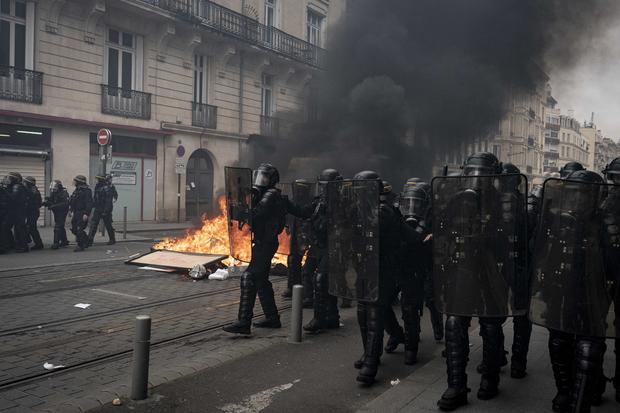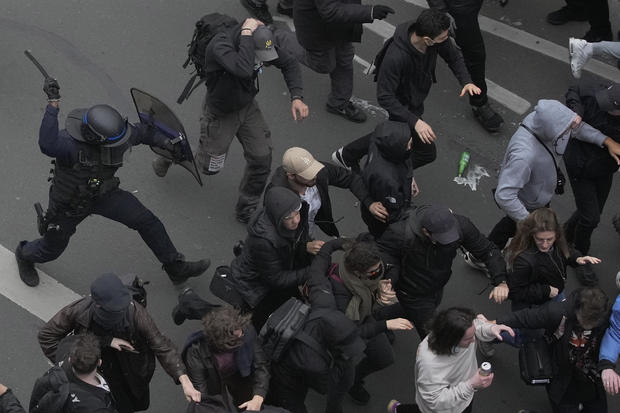King Charles III visit to France delayed by protests as anger mounts over Macron’s pension reforms
Paris — Massive protests across France against President Emmanuel Macron’s national pension reforms have delayed the first state visit by Britain’s new monarch, King Charles III. Charles had been set to visit Bordeaux on Tuesday next week as part of a four-day visit to France, but that city was one of many across France hit by massive unrest on Thursday, with the entrance to its city hall being set alight during a demonstration.
France’s presidency announced Friday that the visit had been postponed after French labor unions announced a new day of strike and protest action for the very day Charles had been scheduled to visit Bordeaux. The two countries decided to wait, promising a new visit would be organized soon. Macron later said it would likely take place in “early summer.”
Fabien Pallueau/NurPhoto/Getty
The British prime minister’s office said the decision to postpone Charles’s visit “was taken with the consent of all parties” involved after Macron’s administration requested the delay.
“Given yesterday’s announcement of a new national day of action against pension reform on Tuesday March 28 in France, the visit of King Charles III, initially scheduled for March 26 to 29 in our country, will be postponed,” the Élysée Palace, France’s presidential office, said in a statement.
The significant rescheduling of the king’s state visit came after more than a million demonstrators took to the streets in France Thursday to protest against government’s plan to raise the retirement age from 62 to 64. It was the ninth day of national action, and it was again marred by outbreaks of violence and vandalism.
Christophe Ena/AP
There were protests in more than 200 towns and cities across France. As well as Bordeaux’s City Hall, other symbols of power were targeted, including police stations and courthouses.
There were more people on the streets and more violence on the sidelines of the marches as people vented their anger at Macron, whose televised interview two days ago served only to make them more convinced that the president is out of touch with strong public sentiments against his reforms.
In Paris and other places, riot police used tear gas to clear groups of troublemakers who threw firecrackers and ripped up paving stones to hurl at officers.
Macron has made it clear that his reforms will go ahead and will begin to roll out next September as planned. Despite the unrest that has continued since January, there’s been no indication that the government or the labor unions driving the strikes and protests are about to back down from their positions.
Anger at Macron’s reforms has in fact been building, not abating. Many workers feel it’s unfair that they will be forced to alter their plans for the future. Women, in particular, have been angered because they were promised the reforms would improve the situation for those who take time off work to look after children, but along with the age raise, the reforms mean people will now have to work 44 years to get a full pension — which means many women will still be worse off than men.
The bill is now with the Constitutional Council, which has to vet it and either approve it or send it back to parliament to be amended. That process will take a month.
For all the latest World News Click Here
For the latest news and updates, follow us on Google News.



